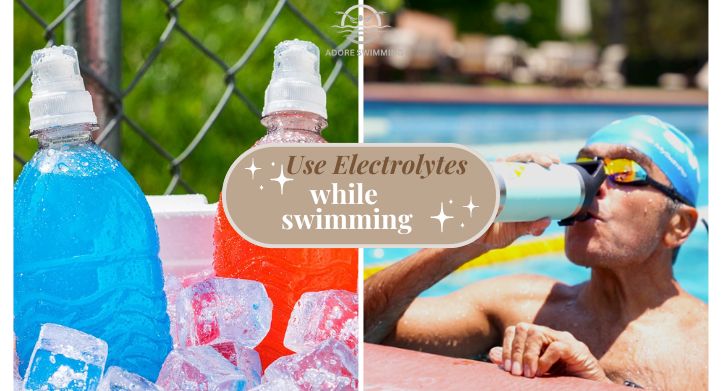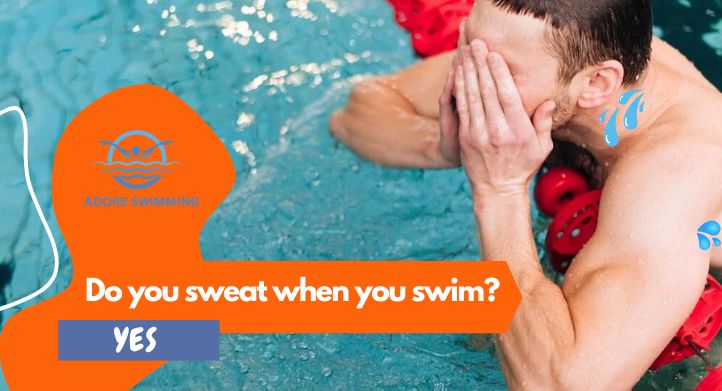Do you sweat when you swim? (Truth About Sweating in Water)
The actual answer to the question of: Do you sweat when you swim? Yes, but you don’t feel like you’re sweating.
When you exercise, your muscles work hard and your body temperature rises, so sweating will occur.
In a pool, the sweat is produced, but it simply mixes with the pool water instead of evaporating off your skin.
Actually, in water, your body is working hard to cool you down, but you don’t feel it.
Do Swimmers Sweat While They Are Competing?
Absolutely. They sweat a lot. Competitive swimming is an incredibly demanding, full-body workout.
An elite swimmer’s body generates heat during a competition or training session. So, when you ask, do you sweat while swimming laps with intensity? The answer is “yes”.
If you are a competitive swimmer, you will notice your sticky skin after drying the pool water from your skin.
The role of Water Temperature in a swimmer’s sweating!
Let’s see, do you sweat when swimming with different water temperatures?
Do You Sweat in Hot Water?
Yes, you will sweat more than you would in a cooler pool.
The water itself is too warm to cool your body down, so your body has to do all the work itself. To keep from overheating, it uses its main cooling tool: sweating.
Do You Sweat When You Swim in Cold Water?
Yes, you still sweat, even if it sounds strange. Think of it this way: your hard workout is like a furnace, making you hot on the inside. The cold water cools your skin on the outside.
Your body’s main job is to cool that internal furnace down, so it will still produce sweat to do that, no matter how cold your skin feels.
The Pool temperature of 26–29 °C keeps you feeling cool even while sweating inside.
The Hidden Danger: Dehydration from sweating in water
The biggest takeaway from all this is the risk of dehydration. Because swimmers don’t feel themselves sweating, they often don’t feel the thirst.
The answer to ‘Do you sweat while swimming?’ is critical because it directly impacts performance and health.
Proper hydration is key to unlocking the full benefits of swimming and preventing issues like muscle cramps, fatigue, and dizziness.
Even though you’re in water, your body still loses fluids through sweat.
*** Here are some tips:
1. Drink Before and After Swimming
You may not feel thirsty, but you still sweat, especially in warm pools.
Drink water to avoid dehydration. bring a sports drink bottle to sip between sets or during breaks.
2. Weigh Yourself after your swim session
weigh yourself before and after your session. If you lose 1 kg (2.2 lbs.), that’s about 1 liter of fluid lost through sweat. Helps fine-tune your hydration needs.
3. Use Electrolytes for more than 60 minutes swimming

For swims over 60 minutes, or in hot water/open water, plain water may not be enough.
Use drinks with electrolytes (like sodium, potassium, and magnesium) to stay balanced.
5. Cool down before wearing your clothes
After swimming, your body might keep sweating for a while. Cool down, and don’t jump straight into warm clothes.
FAQs
Do you sweat when you swim in a pool?
Yes. When your body gets hot from exercise, it sweats to cool down. The pool water just washes the sweat away instantly, so you never feel it.
Do you sweat more, swimming or running?
Most people would say running, because you can see and feel yourself getting drenched in sweat. But swimmers know that after a tough practice, especially in a warmer pool, you can sweat just as much—you just don't notice it until you get out and feel super thirsty.
Does my body absorb water when I swim?
No. Think of your skin like a waterproof jacket. It's designed to keep water out. The only way to hydrate your body is by drinking water, not by soaking in it.



Leave A Comment